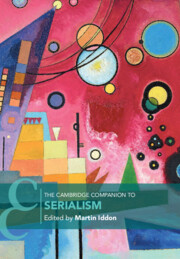Book contents
- The Cambridge Companion to Serialism
- Cambridge Companions to Music
- The Cambridge Companion to Serialism
- Copyright page
- Contents
- Figures
- Tables
- Contributors
- Preface
- Part I Contexts I
- Part II Composers
- 4 Arnold Schoenberg and the ‘Musical Idea’
- 5 Alban Berg’s Eclectic Serialism
- 6 Rethinking Late Webern
- 7 Milton Babbitt and ‘Total’ Serialism
- 8 Pierre Boulez and the Redefinition of Serialism
- 9 The Serial Music of Karlheinz Stockhausen
- 10 Luigi Nono and the Development of Serial Technique
- 11 Stravinsky’s Path to Serialism
- Part III Geographies
- Part IV Contexts II
- References
- Index
10 - Luigi Nono and the Development of Serial Technique
from Part II - Composers
Published online by Cambridge University Press: 07 March 2023
- The Cambridge Companion to Serialism
- Cambridge Companions to Music
- The Cambridge Companion to Serialism
- Copyright page
- Contents
- Figures
- Tables
- Contributors
- Preface
- Part I Contexts I
- Part II Composers
- 4 Arnold Schoenberg and the ‘Musical Idea’
- 5 Alban Berg’s Eclectic Serialism
- 6 Rethinking Late Webern
- 7 Milton Babbitt and ‘Total’ Serialism
- 8 Pierre Boulez and the Redefinition of Serialism
- 9 The Serial Music of Karlheinz Stockhausen
- 10 Luigi Nono and the Development of Serial Technique
- 11 Stravinsky’s Path to Serialism
- Part III Geographies
- Part IV Contexts II
- References
- Index
Summary
Luigi Nono was one the first and foremost Italian composers to develop multiple serialism. Stimulated by the teachings and friendship of Bruno Maderna, in the years 1950–1 he started composing with an extended twelve-tone technique that involved complex rhythmic permutations. While developing a special interest in translating verbal formations (especially poetry) into musical structures, around 1954 Nono started a fruitful exchange with Karlheinz Stockhausen on the problems of integral serialism, which culminated in 1958–9 in controversy over the serial workings of Nono’s Il canto sospeso, also related to the function of the textual underlay. In 1957, Nono had taken up a public discussion of serial technique from the perspective of its historical foundation. Increasingly concerned with an organic approach to vocal-instrumental sound and with the significance of text in relation to it, Nono defined a personal multi-parametric technique which enabled him to find a consistent way of composing both complex sound fields and monodic processes, which ultimately led him to vocal-electroacoustic composition in the 1960s.
Keywords
- Type
- Chapter
- Information
- The Cambridge Companion to Serialism , pp. 154 - 182Publisher: Cambridge University PressPrint publication year: 2023
- 1
- Cited by

